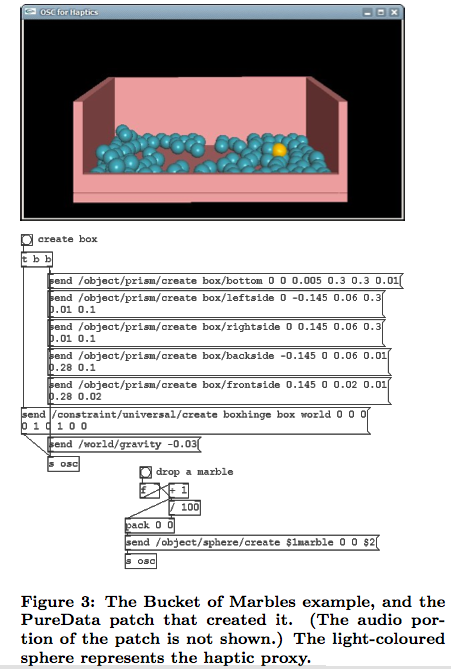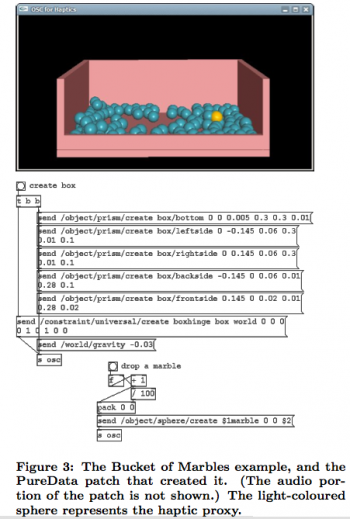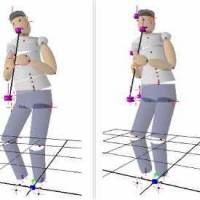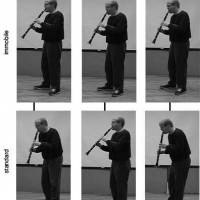ENACTIVE Interfaces
| Participants: |
Marcelo M. Wanderley (PI) Philippe Depalle (SPCL) Catherine Guastavino Vincent Hayward Stephen McAdams Gary Scavone (CIRMMT, McGill University) Delphine Bernardin Bruno Giordano |
Mounia Ziat Matthieu Lagrange Emma Murphy Ilja Frissen Stephen Sinclair Erwin Schoonderwaldt Rafa Absar Denis Lebel |

|
|---|---|---|---|
| Collaborators: |
Massimo Bergamasco (PERCRO, Pisa - ENACTIVE PI) Federico Avanzini (DEI, Padova) Benoit Bardy (Université de Montpellier I) Ronan Boulic (EPFL, Lauzanne) Claude Cadoz (ACROE/INPG, Grenoble) Marc Ernst (MPI, Tübingen) |
Jean-Loup Florens (ACROE/INPG, Grenoble) Annie Luciani (ACROE/INPG, Grenoble) Barbara Mazzarino (DIST, Genoa) Sile O'Modhrain (Queen's University, Belfast) Kevin O'Regan (CNRS, Paris) Thomas Stoffregen (University of Minnesota) |
|
| Funding: |
NSERC Special Research Opportunity Grant Quebec's Ministry of Enconomic Development (PSIIRI Grant) European Community |
||
| Project Type: | 6th Framework European Network of Excellence. | ||
| Time Period: | Jan. 2004–Dec. 2007. (Completed.) | ||
Project Description
The European 6th Framework Network of Excellence ENACTIVE Interfaces started its activities on January 1st, 2004 and consists of two main phases: an initial 18-month period of information exchange, initial collaboration, and “mise à niveau”, and a subsequent 30-month period of active collaborative research including joint experiments and common developments among the various partners. The ENACTIVE Network integrates European researchers for the development, dissemination, and standardization of innovative interfaces and interaction paradigms, based on the new paradigm of Enactive knowledge, which proposes a closed link between action and perception.
Enactive knowledge can be described as knowledge stored in the form of sensory-motor responses and acquired by the act of “doing”. It is a form of cognition inherently tied to actions, capable of conveying a non-symbolic form of interaction. Enactive interfaces move away from the current symbolic WIMP paradigm (Windows, Icons, Menu and Pointers) to action-driven interfaces. One natural area of research in action-driven interfaces is music performance.
CIRMMT's Participation
Our participation is divided in two parts:
- the study of human behavior during the performance of music, including the perception of visual results of movement and the study of postural dynamics in musical performance;
- the integration of audio and haptic information, focusing on the development of tools (audio and haptic synthesis) for the design of enactive interfaces, and on the investigation of the coupling of perception and action in Hearing and Haptics.
Events
We have also hosted the Second ENACTIVE Workshop on May 25-27 2006, consisting on research talks and group discussions on the various aspects of the ENACTIVE Network European project.
Invited talks were given by Prof. Vincent Hayward (Electrical and Computer Engineering, CIM, CIRMMT, McGill) and by Prof. Stephen McAdams (Schulich School of Music, CIRMMT, McGill).
Research sessions included: “Theoretical issues on Enactive Interfaces”, “Technology for Enactive Interfaces”, “Enactive Interfaces and human studies”, and “Enactive Interfaces and Applications”.
Related Projects





